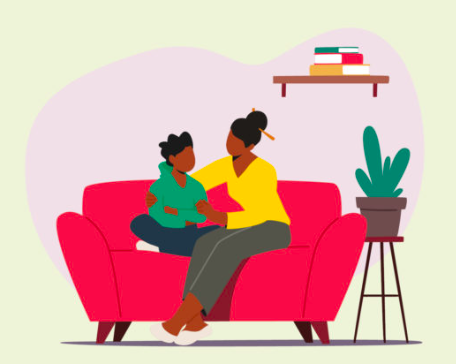Children of all ages need parents and caregivers who are warm and responsive, who pay them attention and who make them feel safe. Here are ideas to help you keep building this kind of relationship with your school-age child.
Connecting
- Give your child plenty of positive attention by showing warmth and being interested in what they’re doing. One way to do this is by asking follow-up questions when your child starts talking – for example, ‘Really? That’s funny! What did the teacher say then?’ This keeps the conversation going.
- Use everyday moments and activities to build your relationship with your child. For example, driving your child to an activity might be a chance for an uninterrupted chat.
- Make time to share things you both enjoy, like cooking or kicking a ball at the park. This can also give you a chance to find out more about your child’s likes and dislikes, worries and frustrations. Some children find it easier to talk when they’re doing something else.
- Tune in to your child. If you see your child is getting angry or upset, help them understand their emotions. For example, ‘I can see that you’re feeling angry about turning off the TV’. Understanding emotions is a key part of self-regulation, which is important for all your child’s relationships.
Communicating
- Avoid asking your child a lot of questions about school when they get home from school. Your child will probably be tired and hungry. When you sense that your child is ready to talk about school, simple, positive and specific questions can start a conversation. For example, ‘Who did you sit with at lunchtime?’ or ‘What was the best part of your day?’
- If your child asks about tough topics, answer honestly, in language that they can understand. For example, ‘We love you. But we think the family will be happier if Dad and I live in different houses.’
Family life
- Set some positive family rules to guide how your school-age child treats you and other family members. Rules that describe the behaviour you expect can help everyone in your family get along better. For example, ‘We say “please” when we ask for something’.
- Share regular family meals. Family meals can strengthen your family relationships and your child’s sense of belonging. They’re also a good chance to catch up on each family member’s day.
- Keep up family rituals like birthday celebrations, family movie nights or bike rides on the weekend. Rituals create shared memories and build family relationships and bonds.
It’s important to look after yourself. Even spending a few minutes each day doing something you enjoy like going for a walk or reading a magazine can make a big difference to how you feel about the time you spend with your child. Looking after yourself is good for you, so it’s good for your relationship with your child and their development.

To learn more about how you can continue building strong relationships in the home, see Raising Children.
Raising Children (2023). Suitable for 5-8 years old. Relationships with school-age children: ideas and tips. https://raisingchildren.net.au/school-age/connecting-communicating/connecting/connecting-with-your-school-age-child
